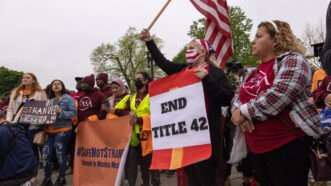Law & Government
Delta-8 Cannabis Compound Is Legal, Says Federal Appeals Court
Plus: Libertarian Party changes abortion and bigotry planks, the FDA's weird rejection of fluvoxamine for treating COVID-19, and more...
Slippery Slope June
How should we think about slippery slope arguments, whether they come from liberals or conservatives or libertarians or anyone else?
A Former Public Defender Joins the Supreme Court
Newly confirmed Supreme Court Justice Ketanji Brown Jackson has a good track record on cases involving qualified immunity.
Habeas Grant in Defense-of-Others Case
A crack theft leads to alleged attempted rape and the shooting of the drug dealers / alleged attempted rapist.
The Return of Earmarks Means More Pork-Barrel Spending by Congress
Lawmakers stuffed more than $8 billion in pet projects into an omnibus federal spending bill passed in March. But wait, didn't Congress ban earmarks back in 2011?
Appellate Court Upholds Trial Court's Rejection of "[Independent] Custody Investigator" Opinion
Among other things, the investigator "appeared to accept Father’s explanation that his 2003 kidnapping conviction based on allegations of domestic violence in a previous relationship was a misunderstanding, not the result of criminal conduct," "[finding] 'credible' Father’s explanation that he 'was unfairly incarcerated based on the lies of the victim and because of the racist justice system.'"
A Maine Couple Is Suing the State for the Right To Hunt on Sundays
The Parkers filed their lawsuit under Maine’s new ‘right-to-food’ constitutional amendment.
No Religious Freedom Problem with Court Approving One Parent's Choice of Religious School,
so long as the court makes the decision for secular reasons.
Filing False Accusation with Police Is Grounds for Attorney Discipline
Pretty obvious, I think, but helpful to see a specific case on the subject.
Supreme Court Turns Away Red State Effort to Block Social Cost of Carbon
Without opinion the justices rejected Louisiana's application to vacate a lower court stay.
The DOJ Says a Man Whose Record Was Expunged Still Must Register As a Sex Offender, Which Is Impossible
A federal lawsuit argues that the department's regulations violate due process, the separation of powers, and the First Amendment.
Your Flight Is Delayed. Thank the Feds.
Congress has radically restricted the number of pilots without doing anything to increase safety.
Alien Civilizations Either Self-Destruct or Transcend to 'Homeostatic Awakening,' Argues New Study
And one or the other is likely our fate too.
Dr. Oz Warns That Legalizing Marijuana in Pennsylvania Would Aggravate Unemployment by Weakening 'Mojo'
The Republican Senate candidate is echoing decades of anti-pot propaganda, but evidence to support his hypothesis is hard to find.
Court Won't Let CDC End Migrant Expulsion Order Just Yet
Plus: Book bans come for Barnes & Noble, a blow to SEC enforcement power, and more...
Blundering Into Escalation in Ukraine?
Plus: A listener asks if it’s possible for bureaucracy ever to be good.
What's Next for Russia's War in Ukraine?
There’s no endpoint in sight to a war that threatens widespread consequences.
Banning 'Unconscionable Excessive' Gas Prices Is Risky Economic Nonsense
Democrats are trying to inject a political solution into an economic problem.
Republicans Defend Texas Social Media Law—and Compelled Speech
Plus: Twitter defends user anonymity, Oklahoma legislature approves abortion ban, and more...
Ninth Circuit Concludes Arizona Has Standing to Challenge Conditions on COVID Relief Funds
Language in the American Rescue Plan Act prohibits states from using the funds "directly or indirectly" to offset lost revenues from tax cuts.
Jerome Powell, Who Wildly Misjudged Inflation, Is Overwhelmingly Reconfirmed as Fed Chair
There is seldom any meaningful accountability for government incompetence.
Are Elephants People? New York's Highest Court Hears Case for Animal Personhood
Plus: School voucher program survives lawsuit, Biden invokes Defense Production Act for formula, and more...
Bad Day in Court for the Administrative State
Fifth Circuit panel finds several constitutional problems with the Securities and Exchange Commission
Isaac Chotiner Interviews Professor Laurence Tribe
A revealing interview on the Supreme Court, Chief Justice Roberts, climate change, and Tribe's tweeting habits.
Victories for Rand Paul, Pot, and Some MAGA Candidates in Primary Elections
Plus: a debate about sex work, Facebook blocks a baby formula recipe, and more...
Pennsylvania Voters Rejected the Political Establishment in Tuesday's Primaries
But the pitched battle for the GOP Senate nomination in the Keystone State is still too close to call.
Lawyer's Asking School Employee Whether She Had Ever Kissed a Woman Not Workplace Harassment,
when the lawyers are investigating allegations that the employee "had romantic or sexual feelings for one of the students she coached."
Former FDA Official: The Prohibition on European Baby Formula Isn't About Safety
"The knot in getting that product into the U.S. isn't safety, it's a regulatory issue," says Peter Pitts.
Ninth Circuit Upholds Dismissal of Claim Alleging Unconstitutional Police Mishandling of Rape Accusations
Plaintiff had shown the police cell phone messages in which she “casually discussed the sexual activity that occurred the night of the alleged rape and agreed to meet [the person she was accusing] again for a future sexual encounter,” and “told the alleged assailant that she ‘could make him lose his job’ after she discovered that he had remained active on the online dating website where they met.”
What Happens if States Ban Out-of-State Travel for Abortion?
Anti-abortion interstate travel bans would have multiple constitutional defects.
Judge Neomi Rao on "The Province of the Law"
A belated 2021 lecture sponsored by the Georgetown Center for the Constitution
Text and History for Thee but Not for Me?
The Court makes other people follow the text and history, but at least when it comes to certiorari, the justices lose their religion.
The Failed Senate Abortion Bill Went Far Beyond Preserving Current Rights
Without citing any constitutional authority to dictate state abortion policies, the bill would have overridden regulations that have been upheld or have yet to be tested.
The V.A. Bought 10,000 iPhones for Veterans. 8,544 of Them Were Never Used.
The department lost nearly $2.4 million on data plans for iPhones and iPads that sat in storage.
Gwyneth Paltrow's Gemstone-Encrusted Alpaca Wool Diaper Is…a Tax Protest?
"If treating diapers like a luxury makes you mad, so should taxing them like a luxury," said Paltrow.
Teacher Has Free Exercise Clause Right to Tell Parents About Their Children's "Preferred Names and Pronouns,"
despite a school policy that generally bars teachers from doing so. (For my views on the question, see the end of the post.)
The Supreme Court's Olmstead Power Grab
Olmstead isn't just a wiretapping case; it's where the Court took the power to preselect questions.


























